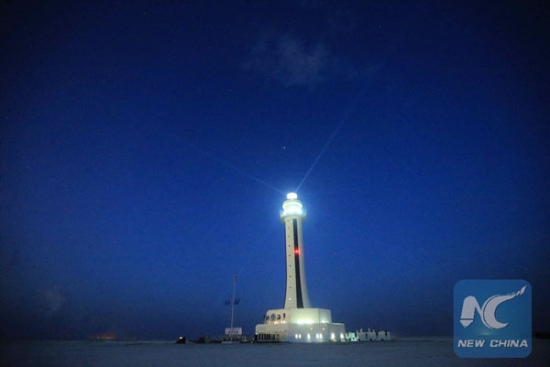
Photo taken on April 5, 2016 shows the lighthouse on Zhubi Reef of Nansha Islands in the South China Sea, south China. (Photo: Xinhua/Xing Guangli)
China will never "bully" small countries, nor will it tolerate "blackmail" on the South China Sea issue, a Foreign Ministry spokesman said on Monday.
Spokesman Lu Kang made the remarks at a daily press briefing in response to claims that the Philippines initiated arbitration due to the two countries' very unequal strengths which makes it unable to solve maritime delimitation disputes with China through dialogue.
"Such an argument confuses right and wrong and reminds us of the so-called theory of original sin of major powers," said Lu.
Calling the rhetoric "obviously from those who attempt to smear China," Lu said the logic behind the rhetoric is that "a strong nation is bound to seek hegemony."
China adheres to the path of peaceful development and follows a national defense policy that is defensive in nature, said Lu.
China persists in building good-neighborly relationships and partnerships with its neighbors and in solving disputes through dialogue and negotiation, he said.
Since the establishment of the People's Republic of China in 1949, China has successfully solved boundary issues with 12 of its 14 land neighbors via consultation in accordance with historical facts, on the basis norms of international law, said Lu.
The entire length of demarcated and delineated boundary has reached 20,000 kilometers, which accounts for 90 percent of China's total land boundary, he added.
Another example is that China and Vietnam delineated the maritime boundary in the Beibu Gulf via negotiations, Lu said.
China knows its responsibility and obligation to safeguard regional peace and stability, said Lu.
Stressing that China has dealt with the South China Sea issue in a constructive way, Lu said the door for dialogue has always been open.
However, the Philippines, disregard of the consensus reached with China, shows no sincerity in solving the South China Sea issue through dialogue and "pretends to be a victim," said the spokesman, accusing Manila of stirring up trouble and aggravating the situation.
Manila unilaterally initiated an arbitration case against China over maritime disputes in the South China Sea at the Permanent Court of Arbitration in The Hague in early 2013 under the UN Convention on the Law of the Sea (UNCLOS). The decision will probably be announced in May or June.
When asked to comment on former U.S. Secretary of Defense Chuck Hagel's recent remarks, Lu said some people choose to turn a blind eye to basic facts about the South China Sea issue and wantonly manipulated international law.
According to reports, Hagel said it would be "dangerous" for either side to disobey a decision of the Permanent Court of Arbitration.
Lu said China's position of non-acceptance and non-participation in the arbitration unilaterally initiated by the Philippines is clear and consistent.
Some Americans consider themselves champions of the rule of the law, yet the United States remains a non-signatory to the UNCLOS passed in 1982, said Lu.
The United States requires other countries to accept the settlement of disputes through a third party, yet itself has kept away from accepting the decisions of the UN court, he said.
It urges other countries to abide by international law, yet it keeps door wide open for illegal action by itself and its allies, said Lu, adding that the United States has ignored the Philippines' infringement to some islands and reefs of China's Nansha Islands for a long time.
Using the international law when convenient and abandoning it in unfavorable conditions gravely undermine the authority, solemnity and effectiveness of the international law, said Lu.
"This is a dangerous act that the international community must heighten vigilance against," he said.
The South China Sea disputes between China and the Philippines are over territorial and maritime delimitation. China declared in 2006 that arbitration and other compulsory dispute settlement procedures do not apply to issues such as maritime delimitation, as outlined in Article 298 of the UNCLOS.


















































